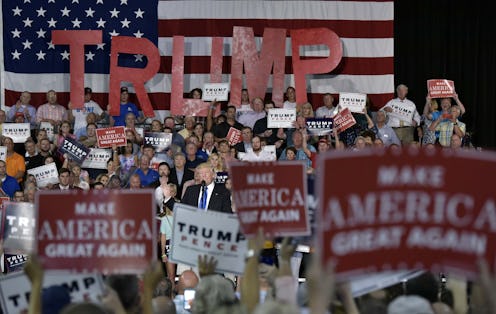News
How Donald Trump Flipped The Republican Party
Donald Trump has certainly left his mark on this election season. He's said some of the wildest things you might ever hear in politics for the rest of your life, and some things that you just never wanted to hear in your whole life (the unforgettable comment about his hand size? I wish I could forget it). But it looks like Trump's influence on politics might last a lot longer than expected, even if he doesn't win the election in November. Trump has fundamentally changed the Republican party, specifically its defense policy, without anyone really realizing it, and that could have a serious and long-lasting impact on American politics.
Trump's love of Russia and its president Vladimir Putin has fascinated and frightened many for months now, as Trump has increasingly mentioned the strength and success of Putin's semi-authoritarian leadership. Those fears seem to be actualizing in recent weeks, as Trump both surges in the polls and continues to push for relaxed relations with Russia. Trump even reportedly managed to secure a crucial change in the Republican party platform on the party's official stance in the Ukraine-Russia insurrection.
Since 1945, the U.S. has maintained a rather adversarial relationship with Russia, and the Republican party was at the forefront of that charge. But as the current leader of the party, Trump is pushing the party away from its traditional strong military, interventionist, no-holds-barred foreign policy.
The wildest thing is that people are totally on board. The fans at his rally last week in Greenville, North Carolina, were cheering their heads off when Trump said that the U.S. should have friendlier relations with Russia and it should stop trying to force democracy on other countries. The response to his comments at the Commander in Chief Forum earlier this month was pretty similar. "I think under the leadership of Barack Obama and Hillary Clinton, the generals have been reduced to rubble," Trump said at the forum. "They have been reduced to a point where it's embarrassing for our country."
In the past, that type of comment simply wouldn't have been acceptable by the Republican base, but because it was cloaked as a burn against Obama and Clinton, Trump got away with it. Even his criticism of the Khan family from the Democratic National Convention wasn't met with the massive drop in support that many commentators expected. Of those that support Trump, there doesn't seem to be any real adherence to the traditional Republican ideology of spreading democracy and supporting the military, indicating that he's really fundamentally changed the party.
Granted, someone else just as influential and opinionated may come along in four or eight years and flip the party again, essentially neutralizing the long-term effects of the Trump-induced flip flop. But that could be really hard to do. It seems that there's a large of segment of the population that was ready to accept this message of Russian support, and reversing that tide could be easier said than done.
